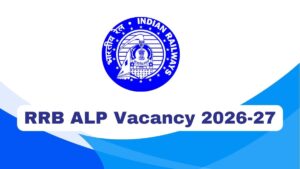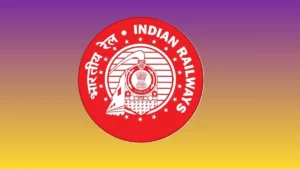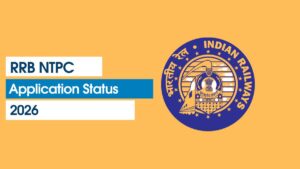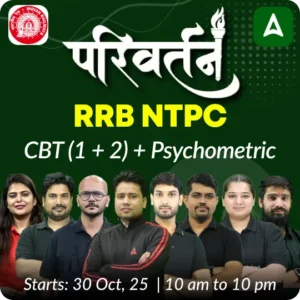The Railway Recruitment Board (RRB) conducts various exams to recruit candidates for Indian Railways, among which RRB NTPC and RRB Group D are the most popular. While both exams offer excellent job opportunities, they differ significantly in terms of eligibility, job profile, salary, selection process, and career growth. This article provides a detailed comparison between RRB NTPC and RRB Group D to help candidates choose the most suitable exam based on their qualifications and career goals.
What is RRB NTPC?
RRB NTPC (Non-Technical Popular Categories) exam is conducted for both undergraduate and graduate posts. The popular posts under RRB NTPC include Goods Guard, Senior Clerk cum Typist, Junior Account Assistant cum Typist, Station Master, Trains Clerk, and Junior Clerk cum Typist.
Key Highlights:
- Qualification Required: 12th Pass or Graduate (depending on the post)
- Selection Process: CBT 1, CBT 2, Typing Skill Test (if applicable), Document Verification, Medical Test
- Job Location: Across India
- Job Type: Supervisory and clerical roles
What is RRB Group D?
RRB Group D exam is conducted to recruit candidates for various maintenance and support staff posts in Indian Railways. The posts include Track Maintainer Grade-IV, Helper/Assistant in Electrical, Mechanical, and S&T departments, and Assistant Pointsman.
Check: RRB Group D Admit Card 2025 Out
Key Highlights:
- Qualification Required: 10th Pass or ITI from recognized institutions
- Selection Process: CBT, Physical Efficiency Test (PET), Document Verification, Medical Test
- Job Location: Across India
- Job Type: Fieldwork and support staff roles
Detailed Comparison: RRB NTPC vs RRB Group D
| Features | RRB NTPC | RRB Group D |
|---|---|---|
| Educational Qualification | 12th Pass/Graduate | 10th Pass/ITI |
| Posts Offered | Clerical and Supervisor Level | Track Maintainers, Helpers, Pointsman |
| Selection Process | CBT 1, CBT 2, Typing Skill Test, Document Verification, Medical Test | CBT, Physical Efficiency Test, Document Verification, Medical Test |
| Job Responsibilities | Office-based tasks, train operations management, ticketing, supervision | Physical work, maintenance of railway tracks, signaling, assistance in train operations |
| Exam Difficulty Level | Moderate | Easy to Moderate |
| Physical Test | Not Required (except medical fitness) | Required (Physical Efficiency Test) |
| Career Growth | Fast-track promotions available to higher supervisory positions | Gradual promotions, can reach senior maintenance roles |
| Salary Structure | Starts at Level 2 to Level 6 (Varies by post) | Starts at Level 1 |
| Work Environment | Primarily indoor and office work | Fieldwork and outdoor duties |
Which Exam Should You Choose?
Choose RRB NTPC If:
- You meet the educational qualification of 12th pass or graduation.
- You prefer a job with clerical or supervisory responsibilities.
- You aim for faster career growth and promotions.
- You are comfortable with a competitive, multi-stage selection process.
Choose RRB Group D If:
- You meet the minimum qualification of 10th pass or ITI.
- You prefer physical and fieldwork roles.
- You want a relatively simpler exam and selection process.
- You are aiming to quickly secure a government job.
Both RRB NTPC and RRB Group D offer excellent job opportunities in Indian Railways but cater to different profiles and aspirations. Candidates should carefully assess the eligibility criteria, job nature, selection process, and long-term growth prospects before making a decision. Those looking for administrative or office-based jobs should target NTPC, while those interested in practical, field-based roles should consider Group D. Thorough preparation and understanding of each exam’s structure will help candidates perform well and secure their desired positions in Indian Railways.




 RRB ALP Vacancy 2026-27 Announced, 11,12...
RRB ALP Vacancy 2026-27 Announced, 11,12...
 RRB Isolated Categories Exam Date 2026 S...
RRB Isolated Categories Exam Date 2026 S...
 RRB NTPC Undergraduate Application Statu...
RRB NTPC Undergraduate Application Statu...

 Adda247 Job portal has complete information about all Sarkari Jobs and Naukri Alerts, its latest recruitment notifications, from all state and national level jobs and their updates.
Adda247 Job portal has complete information about all Sarkari Jobs and Naukri Alerts, its latest recruitment notifications, from all state and national level jobs and their updates.




